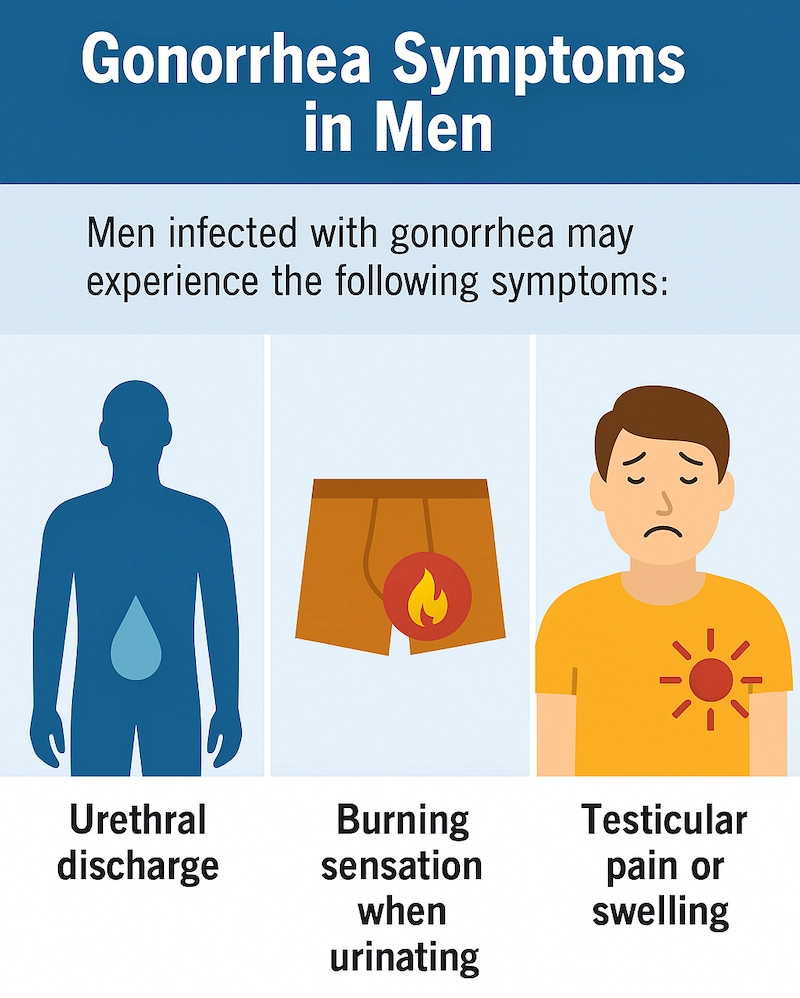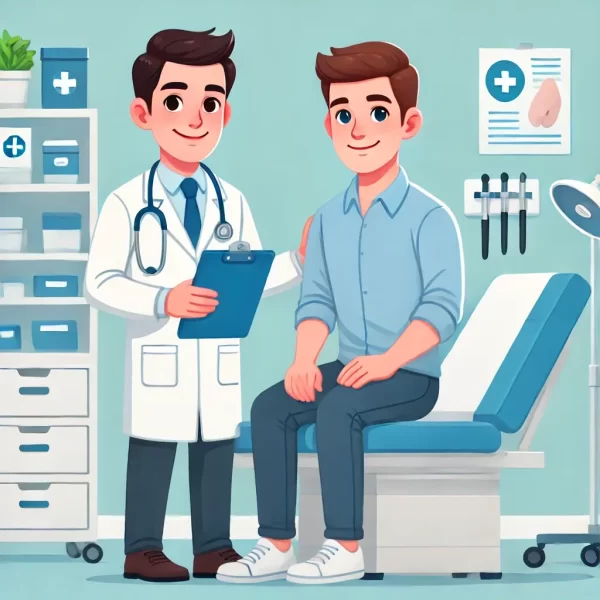Gonorrhea is a common sexually transmitted infection (STI) in men, caused by the bacterium Neisseria gonorrhoeae. It often affects the urethra, rectum, or throat, and can cause painful urination, penile discharge, or testicular pain. However, many cases show no symptoms at all.
If left untreated, gonorrhea can lead to infertility, increased HIV risk, and other serious complications. The good news? It’s easily diagnosed and treatable with antibiotics when detected early.
What Is Gonorrhea?
Gonorrhea in men is a sexually transmitted infection (STI) caused by the bacterium Neisseria gonorrhoeae. This organism infects the mucous membranes of the urethra, rectum, throat, and occasionally the eyes. It is one of the most common STIs worldwide, especially among sexually active men under 30.
The bacteria spread through unprotected vaginal, anal, or oral sex with an infected partner. Gonorrhea can cause painful urination, penile discharge, and testicular discomfort, though many men have no symptoms at all, especially during early stages.
Key Characteristics of Gonorrhea Infection:
- Caused by Neisseria gonorrhoeae, a gram-negative diplococcus
- Affects urethra, but can also infect throat, rectum, and eyes
- Often coexists with chlamydia in dual infections
- Symptoms usually appear 2–7 days after exposure, but can take longer
- Easily transmitted and highly contagious
📊 How Common Is Gonorrhea in Men?
- The CDC reports over 300,000 cases of gonorrhea in U.S. males annually
- Highest rates are in men aged 20–29
- Men who have sex with men (MSM) are disproportionately affected, especially with multi-site infections (rectal, pharyngeal, urethral)
Why Early Diagnosis Matters
If left untreated, gonorrhea can cause serious complications, including:
- Infertility
- Epididymitis
- Increased risk of HIV transmission
- In rare cases, disseminated gonococcal infection (DGI) affecting joints and skin
📌 Understanding what gonorrhea is—and how it spreads—is essential to protect yourself, your health, and your sexual partners.
How Do Men Get Gonorrhea?
Gonorrhea in men is primarily transmitted through sexual contact with an infected partner. The bacteria Neisseria gonorrhoeae is found in infected semen, vaginal fluid, rectal fluid, and throat secretions, and it can easily spread even when no symptoms are present.
1. Vaginal, Anal, and Oral Sex
Gonorrhea spreads through:
- Unprotected vaginal sex (most common route)
- Anal sex, especially among MSM (men who have sex with men)
- Oral sex, which can cause throat infections or urethral exposure
Even without ejaculation, the bacteria can still be transmitted.
2. Asymptomatic Transmission
A person with gonorrhea may:
- Have no symptoms but still be contagious
- Feel completely healthy
- Continue to infect others unknowingly
This is why routine STI screening is critical—especially for sexually active individuals under 30.
3. Reinfection Is Common
Getting gonorrhea once does not provide immunity. You can get reinfected if:
- You have sex with an untreated partner
- You resume unprotected sex before treatment is complete
- Your new or casual partner carries the bacteria
📍 Both partners must be treated to prevent what’s known as “ping-pong” infections.
4. Other Transmission Routes (Less Common)
- Sharing sex toys without cleaning or covering them
- Mother-to-child transmission during childbirth (though more relevant to female infections)
- Contaminated fingers or surfaces in rare eye infections (gonococcal conjunctivitis)
📌 Gonorrhea is highly contagious—but completely preventable with the right protection and testing habits.
Symptoms of Gonorrhea in Men
Gonorrhea in men often affects the urethra, but it can also cause symptoms in the rectum, throat, and eyes, depending on the site of exposure. Symptoms usually appear within 2 to 7 days after exposure—but some men may not experience any signs at all.

🔍 Common Urethral Symptoms (Most Typical)
1. Burning or Painful Urination
One of the earliest and most common signs of urethral gonorrhea.
2. Penile Discharge
- Thick, white, yellow, or green discharge from the tip of the penis
- Often described as “pus-like”
- Usually appears in the morning or after urination
3. Redness or Swelling at the Urethral Opening
Irritation or inflammation may occur around the tip of the penis.
Rectal Gonorrhea Symptoms (in MSM or after anal exposure)
- Anal itching or discomfort
- Rectal pain or bleeding
- Discharge from the rectum
- Straining or discomfort during bowel movements
Throat Gonorrhea Symptoms (from oral sex)
- Sore throat (often mild or mistaken for common cold)
- Swollen lymph nodes
- Difficulty swallowing
- Many cases are completely asymptomatic
⚠️ Less Common But Serious Symptoms
- Testicular pain or swelling (suggests possible epididymitis)
- Painful ejaculation
- Fever or fatigue if infection spreads
Asymptomatic Infections
- Up to 10–15% of men may have no symptoms, especially with rectal or throat gonorrhea
- Still highly contagious
- Can silently lead to complications like infertility or prostate issues
📌 If you notice any unusual genital, urinary, or rectal symptoms—or have had unprotected sex with a new partner—get tested immediately. Early treatment is key to full recovery.
Complications if Gonorrhea Is Left Untreated
Gonorrhea is highly treatable, but if left untreated, it can lead to serious health issues in men. Even asymptomatic infections can silently damage the reproductive system and increase vulnerability to other infections—especially HIV.
1. Epididymitis
The infection can spread to the epididymis, a small tube attached to the back of the testicles.
Symptoms include:
- Scrotal pain or tenderness
- Swelling in one testicle
- Fever or chills (in some cases)
📌 Untreated epididymitis may lead to scarring and infertility.
2. Infertility
Chronic gonorrhea infection may block sperm-carrying tubes or reduce sperm health, leading to male infertility.
Though rare, this is a significant risk when the infection is ignored for long periods.
3. Prostatitis
Gonorrhea can cause prostate gland inflammation, leading to:
- Pelvic pain
- Painful ejaculation
- Urinary difficulty
Prostatitis can become chronic and difficult to manage if not treated early.
4. Disseminated Gonococcal Infection (DGI)
If the bacteria enter the bloodstream, gonorrhea can cause:
- Joint pain and swelling (arthritis-like symptoms)
- Skin rashes or lesions
- Fever and fatigue
📍 DGI is rare but serious—and requires immediate medical attention.
5. Increased Risk of HIV
Gonorrhea causes inflammation and tissue damage, making it easier for HIV to enter the body. Co-infection with HIV is also more likely in untreated cases.
6. Partner Transmission
Undiagnosed gonorrhea puts your sexual partners at risk—especially if they don’t get tested or treated promptly.
📌 The bottom line: ignoring gonorrhea doesn’t make it go away—it increases your risk of long-term reproductive and systemic health problems. Early testing and treatment can prevent all of these complications.
Gonorrhea Testing for Men
Since gonorrhea in men can be asymptomatic, regular testing is crucial for early detection, treatment, and preventing transmission. Fortunately, the testing process is simple, quick, and confidential.
1. When Should Men Get Tested?
You should get tested for gonorrhea if you:
- Have had unprotected sex with a new or casual partner
- Experience burning urination or discharge
- Have a partner who tested positive for an STI
- Are a man who has sex with men (MSM)
- Haven’t been tested in the past 6–12 months
- Have multiple partners or are in an open relationship
📌 Routine screening is especially important for men under 30 and those with higher-risk sexual behavior.
🔍 2. How Is Gonorrhea Diagnosed?
a) Urine Test
- The most common method for urethral gonorrhea
- You’ll provide a urine sample to detect bacterial DNA
b) Urethral Swab
- A swab inserted into the urethra collects fluid
- May be used if discharge is present
c) Throat and Rectal Swabs
- Recommended for MSM and men who engage in oral or anal sex
- Helps detect pharyngeal or rectal gonorrhea, which may not show symptoms
d) At-Home Testing Kits
- Discreet option available from certified labs or clinics
- Collect samples at home and mail them in for results
- Follow-up with a provider is required if results are positive
3. Confidentiality and Privacy
All STI tests, including gonorrhea, are confidential. In most locations:
- Your results are private and not shared without consent
- Many clinics offer free or low-cost testing
- Some offer anonymous or rapid testing services
📌 Testing for gonorrhea is simple and responsible. It’s the first step to protecting your health—and your partners’ health too.
Treatment for Gonorrhea
Gonorrhea in men is curable—but prompt and proper treatment is crucial to prevent complications and avoid spreading the infection. Due to growing concerns over antibiotic resistance, it’s important to follow your doctor’s instructions exactly.
💊 1. First-Line Treatment
According to current CDC guidelines, the recommended treatment is:
Ceftriaxone 500 mg
Administered as a single intramuscular injection
If you weigh over 150 kg (300 lbs), the dose may be increased
Sometimes combined with oral doxycycline if chlamydia co-infection is suspected
📌 Ceftriaxone is currently the most effective antibiotic against gonorrhea.
⚠️ 2. Antibiotic Resistance Warning
Drug-resistant gonorrhea is a growing global concern. Some strains no longer respond to older antibiotics like:
- Azithromycin
- Ciprofloxacin
- Penicillin
This is why self-treatment or relying on outdated medications is dangerous. Always follow your provider’s prescribed treatment plan.
🚫 3. Sexual Activity After Treatment
- Avoid all sexual contact for at least 7 days after treatment
- Make sure your partner is treated as well
- Resume sex only after both you and your partner have completed treatment and symptoms have resolved
📍 Failing to follow this rule increases the risk of reinfection or spreading drug-resistant strains.
4. Treating Your Sexual Partners
If you tested positive:
- Inform all partners within the past 60 days
- They should be tested and treated—even if asymptomatic
- Some regions offer Expedited Partner Therapy (EPT), allowing partners to get treatment without visiting a doctor
5. Follow-Up Testing (Test-of-Cure)
Not routinely needed for uncomplicated infections
Recommended if:
Symptoms persist
You’re at risk for antibiotic resistance
You were treated at a non-specialized clinic
📌 Retesting in 3 months is recommended for all patients due to high reinfection rates.
Gonorrhea is curable—but antibiotic resistance is real. Always complete your treatment, follow provider instructions, and make sure your partner is treated too.
How to Prevent Gonorrhea
While gonorrhea is highly contagious, it’s also highly preventable. By adopting smart sexual health habits and staying proactive, men can significantly reduce their risk of contracting or spreading the infection.
✅ 1. Use Condoms Consistently and Correctly
Condoms are the first line of defense against gonorrhea and other STIs.
- Use a new condom every time you have vaginal, anal, or oral sex
- Put the condom on before any genital contact begins
- Use water-based lubricants to prevent breakage
📌 Condoms don’t eliminate risk entirely, but they dramatically reduce it.
✅ 2. Get Tested Regularly
Routine STI screening helps detect asymptomatic infections—especially important since many cases of gonorrhea show no symptoms.
- Get tested every 6–12 months if you’re sexually active
- Test before starting a new relationship
- Get tested after unprotected sex or suspected exposure
✅ 3. Limit Number of Sexual Partners
Having multiple or anonymous partners increases your risk of encountering gonorrhea. Consider:
- Practicing mutual monogamy
- Ensuring both you and your partner are tested and cleared
✅ 4. Communicate Openly with Partners
Talk honestly about STI status, testing history, and condom use before sex.
This helps:
- Build trust
- Normalize responsible sexual behavior
- Catch and prevent infections early
✅ 5. Avoid Sharing Sex Toys
If sex toys are used:
- Cover them with a new condom before use
- Disinfect thoroughly between partners or uses
- Avoid sharing if cleaning isn’t possible
✅ 6. Follow Treatment Instructions Fully
If you’ve been treated for gonorrhea:
- Avoid sex for at least 7 days
- Complete all medications, even if symptoms go away early
- Inform your partner(s) so they can be treated too
📌 Prevention is all about consistency. By using condoms, getting tested, and having open conversations, you can protect yourself and others from gonorrhea and other STIs.
FAQs About Gonorrhea in Men
❓ Can I have gonorrhea and not know it?
Yes. Many men with gonorrhea have no symptoms, especially with rectal or throat infections. Regular testing is essential.
❓ How soon do symptoms appear after exposure?
Symptoms typically appear within 2 to 7 days, but in some cases, it may take up to 14 days—or show no signs at all.
❓ Does gonorrhea go away on its own?
No. Gonorrhea does not clear up without treatment. Left untreated, it can cause serious health complications.
❓ Can I get gonorrhea more than once?
Absolutely. There’s no immunity after infection. You can be reinfected if exposed again, especially through untreated partners.
❓ How long does treatment take to work?
Most people are no longer contagious 7 days after completing treatment. Avoid all sexual activity during this time.
❓ Do I need to tell my partner if I test positive?
Yes. Partner notification is essential to stop reinfection and further spread. Some clinics offer discreet support for this process.
📌 STI-related questions are common—and important. The more you understand, the more confidently you can protect your health and relationships.
Final Thoughts
Gonorrhea in men is common, contagious, and curable—but only if diagnosed and treated in time. Because symptoms may be mild or even absent, many men unknowingly spread the infection to their partners.
Fortunately, gonorrhea is easily detected with simple tests and treated with a single dose of antibiotics. What matters most is taking action:
- Get tested regularly, even without symptoms
- Use protection during every sexual encounter
- Talk openly with your partners
- Complete your treatment and encourage your partner to do the same
👉 Prioritizing your sexual health is not just smart—it’s respectful, responsible, and empowering.
You deserve clarity, confidence, and control. Don’t wait—get tested, get treated, and protect what matters.





